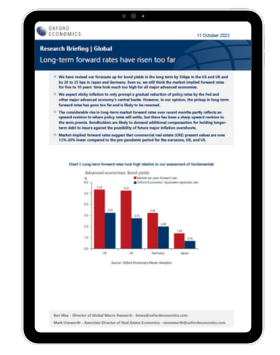Long-term forward rates have risen too far globally

We have revised our forecasts up for bond yields in the long term by 50bps in the US and UK and by 20 to 25 bps in Japan and Germany. Even so, we still think the market-implied forward rates for five to 10 years’ time look much too high for all major advanced economies.
What you will learn:
- We expect sticky inflation to only prompt a gradual reduction of policy rates by the Fed and other major advanced economy’s central banks. However, in our opinion, the pickup in long-term forward rates has gone too far and is likely to be reversed.
- The considerable rise in long-term market forward rates over recent months partly reflects an upward revision to where policy rates will settle, but there has been a sharp upward revision to the term premia. Bondholders are likely to demand additional compensation for holding longer-term debt to insure against the possibility of future major inflation overshoots.
- Market-implied forward rates suggest that commercial real estate (CRE) present values are now 15%-20% lower compared to the pre-pandemic period for the eurozone, UK, and US.
Tags:
Related Posts

Post
Trumponomics – the economics of a second Trump presidency | Beyond the Headlines
The 2024 US Presidential Election is less than seven months away. In this week’s Beyond the Headlines, Bernard Yaros, Lead Economist, outlines two scenarios for the US economy if former President Donald Trump returns to the White House and Republicans sweep Congress.
Find Out More
Post
Cross Asset: Closing our tactical long on gold, but we’re still bullish
The strength of the recent gold price rally has defied even our already bullish expectations and we think prices are vulnerable to a price consolidation in the short term. As a result, we close out our tactical long position on gold that we opened in October last year.
Find Out More
Post
How Inflation eroded governments’ debts and why it matters | Beyond the Headlines
The supply-shocks era (2020-23) represented the first time in a generation where inflation significantly eroded the real value of global public debt. In this week’s video, Gabriel Sterne, Head of Global Emerging Markets, focuses on the extent to which governments seized that opportunity.
Find Out More